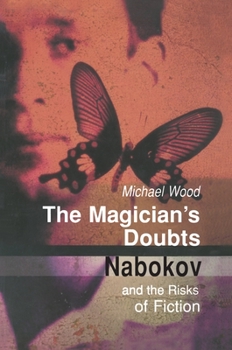The Magician's Doubts: Nabokov and the Risks of Fiction
Select Format
Select Condition 
Book Overview
As a child in Russia, Vladimir Nabokov enjoyed conjuring: "I loved doing simple tricks--turning water into wine, that kind of thing." In this engrossing book Michael Wood explores the blend of arrogance and mischief that makes Nabokov such a fascinating and elusive master of fiction. Wood argues that Nabokov is neither the aesthete he liked to pretend to be nor the heavy-handed moralist recent critics make him. Major works like Pnin, Lolita, Pale...
Format:Hardcover
Language:English
ISBN:0691006326
ISBN13:9780691006321
Release Date:July 1995
Publisher:Princeton University Press
Length:260 Pages
Weight:0.15 lbs.
Dimensions:0.9" x 7.8" x 10.0"
Customer Reviews
1 rating
No Doubts about THE MAGICIAN'S DOUBTS, it is a Valuable Work
Published by Thriftbooks.com User , 24 years ago
I've been reading Nabokov for about 27 years, and re-reading it just as long, including almost every novel, short story, essay, and criticism I could find, as well as the Boyd two-volume biography, to which the previous customer referred. While Boyd's work is thorough and might be called "definitive," Wood's book is purposefully limited in scope. However, I certainly found in-depth analyses of the points and themes Wood chose. The subtitle of this book should also inform the prospective reader, i.e., "Nabokov and the Risks of Fiction." The book is made up of relatively short (the entire paperback is only about 250 pages), somewhat overlapping critical analyses regarding a specific point in six of VN's novels, two short stories, and his translation of EUGENE ONEGIN. Perhaps a few examples from the table of contents will help clarify: 3. The Cruelty of Chance: BEND SINISTER, 'Signs and Symbols', 'The Vane Sisters'; 4. The World Without Us: SPEAK MEMORY; 5. The Language of LOLITA; 8. The Demons of our Pity: PALE FIRE; 9. Happy Families: ADA. I have underlined so much of Wood's text and written so much in the margins that it is difficult to pick out a single example that might illuminate Wood's approach. But here's a try: In "The Language of LOLITA" Wood approaches the novel from Nabokov's games and play with language, and uses them to go into the many oppositions, ironies, and mysteries that abound in the book. For example, Wood cites the passage, "No matter, even if those eyes of hers would swell to myopic fish, and her nipples swell and crack...even then I would still go mad with tenderness at the mere sight of your dear wan face, at the mere sound of your raucous voice, my Lolita." Wood notes the apposition of "wan" and "raucous"; and then goes on with his analysis (within the context of this and other previous essays), "[these] are the notations of desperate love, and Humbert writes here the purest, most precise Nabokovian prose. What we question is not [Humbert's] passion but his supposed new respectability. The whole of [LOLITA] has been asking us to trust Humbert's obsession, even as we are repelled by it. We can't leave off trusting it now...[when the obsession] is so lyrically mourning what it claims it won't miss." Wood goes on to say that it may not be necessary for us to believe what Humbert believes at the end. "Indeed we may understand his crime more fully if we are sceptical about his repentence and altered love...It is easy to confess...and it may actually be to Humbert's credit that he is not entirely convincing in this line, in spite of his ambitions." These critical essays clearly are not meant to go into deep and thorough dissertations of a given work by Nabokov. Rather, I feel Wood is trying to give an overview of Nabokov by examining these particular works, each with a different, purposefully limited thesis. Wood may offend some Nabokov lovers perhaps because he does poi





